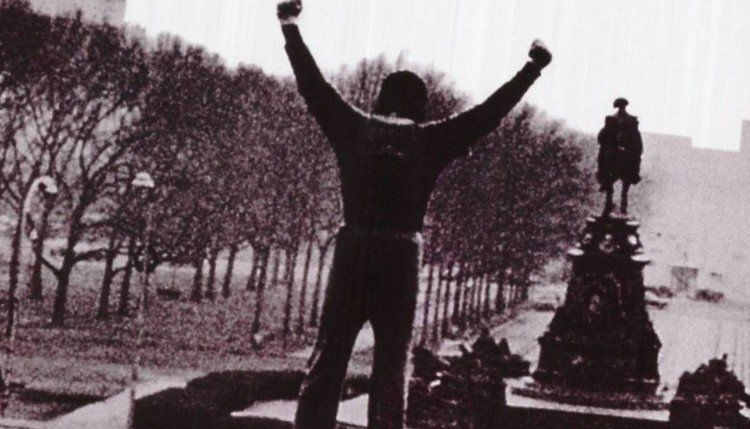Franchise Rewind: Rocky (1976) Rocky II (1979) Rocky III (1982)
Rocky, 1976 (Sylvester Stallone) United Artists
Rocky II, 1979 (Sylvester Stallone) United Artists
Rocky III, 1982 (Sylvester Stallone) MGM/UA
“Beethoven was deaf. Helen Keller was blind. I think Rocky’s got a good chance.”
A meek and modest drama, if there ever was one, Rocky was marketed as a sleeper at a time when movies were given a chance for success. True, this was after Jaws and the dependence (possibly over-reliance) on opening weekend numbers, but if very little money (less than a million dollars) was spent due to the rise of an untested demographic coupled with an inexperienced actor’s screenplay, such experiments were welcome. In fact, Rocky might be the most profitable movie ever made considering it made over $225 million at the box office.
The movie isn’t really about boxing. Sylvester Stallone’s Robert “Rocky” Balboa is a thug enforcer for the local “politician,” Tony Gazzo (the inimitable Joe Spinell). He toyed around with boxing long enough to acquire stats, but he always seemed to fold due to his lack of stamina and inability to take a punch. Enter Apollo Creed, current heavyweight champion of the world. He’s tired of sparring with the same cluster of faces and worries his career may be over soon. He puts out an open call to anyone, any unknown out there who thinks they can go the distance with him, and he’ll even furnish the proceedings and pay his opponent.
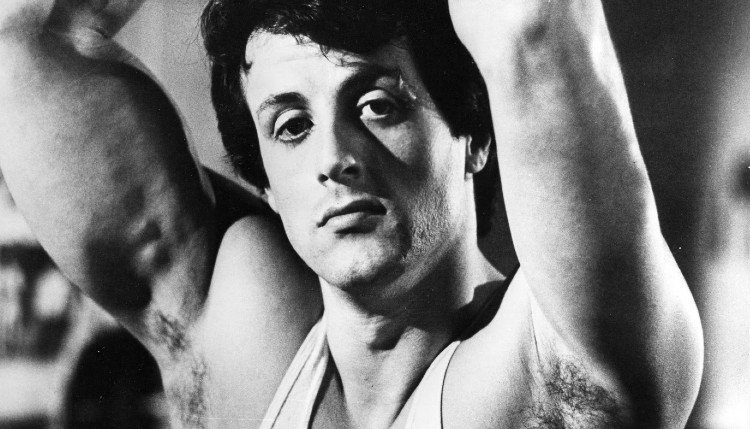
This is all a matter of keeping Creed relevant as a fighter, even though he’s become something of an industry with endorsements and product lines. He represents the establishment; the trained athlete, whereas Balboa represents the auto-didact; the self-taught streetfighter. What’s most impressive about Stallone’s script is that it doesn’t (you’ll forgive the expression) pull any punches. The script introduces us to an imperfect vessel, undisciplined yet capable of understanding his flaws. Even as he works on them, he knows (and we know) he won’t have them completely licked by movie’s end. Rocky (the first Rocky) is a stunning character piece, exemplar of ’70s filmmaking.
Balboa is a man who loses and wins at the same time. He goes the distance with Creed, stunning the boxing world, Creed, and himself. He’s still standing at the end of the fight. He does what few have actually accomplished in the ring with Apollo, and all he wants at that moment is his girlfriend, Adrian (Talia Shire). It’s a beautiful moment in a movie that isn’t about boxing, and it still brings tears to my eyes. I grew up in South Philadelphia where New York City native Stallone sets his Rocky. Balboa, a fictional character, is considered a god in Philadelphia. Isn’t that the basis of mythology?

“I was wonderin’ if, uh, you wouldn’t mind marryin’ me very much.”
I think the sequel mentality of Hollywood started to kick in around the time of Jaws 2. In theory it represented a smaller investment than the original content that preceded it, and since all (or most) principal parties from the first movie are involved, it should mean less work to be done. Because we have a property already in place, the audience should show up at the box office. That’s the theory anyway. I don’t know if it always works.
The reality is, because of inflation and demand, budgets increase. Case in point: Rocky. The first movie cost less than a million. The first sequel cost $7 million. Jaws 2 was triple the budget of the first movie. Rocky, by itself, isn’t a movie I could readily believe needed to be sequelized. It’s a self-contained (perfect) story about a longshot who defies the odds. When the first smell of a sequel enters the room (like burnt toast), it begins to tarnish the shine of the first movie, and it happens with each sequel released.
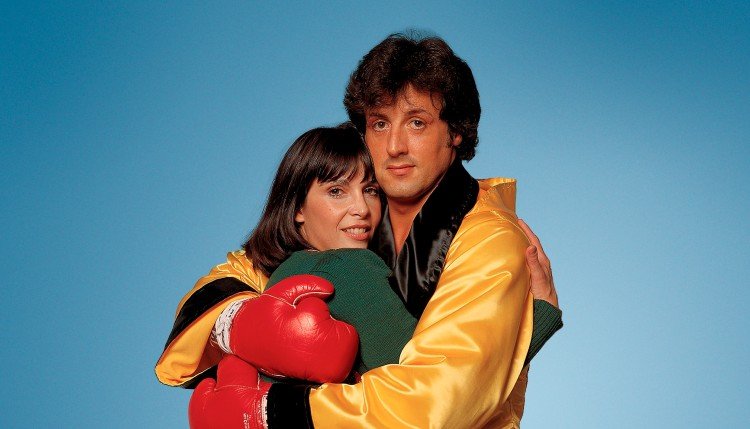
Rocky 2 begins a few minutes after the first movie ends. Both fighters are rushed to the hospital where they engage in a shouting match during a live press conference. Apollo is accused of rigging the fight, and even Balboa has to defend him. Balboa becomes a local celebrity and picks up some endorsements. He and Adrian marry (after Rocky’s charming proposal to her at the Zoo), buy a row house in South Philly, and she soon gives birth to their son.
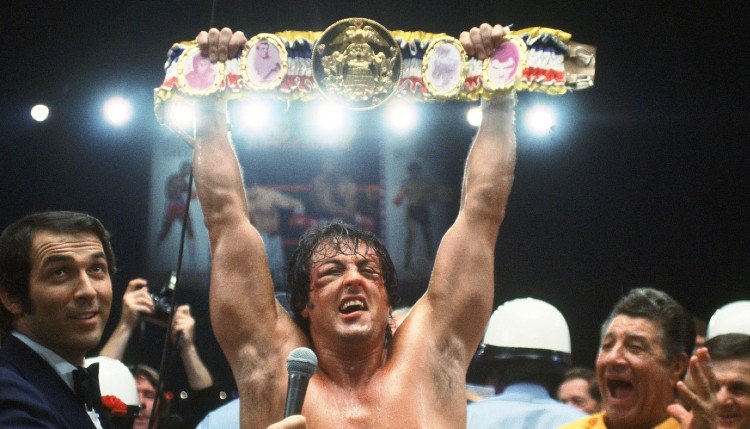
The row house is fantastic. I lived in one when I was a kid. You basically walk in. There’s a row of stairs going up to the second floor. The living room, dining room, and kitchen are all on the first floor. There’s a basement downstairs. It brought back so many memories of my youth; some of them good. Balboa wants to get back into boxing in a big way, but he’s warned by a doctor he could go blind because of a detached retina. His trainer, Mickey (Burgess Meredith) reluctantly goes along with it after Apollo insults Rocky on television. Balboa agrees to a re-match with Creed.
The movie then becomes Rocky with a last-minute Hail Mary rewrite. Instead of Rocky losing, Rocky wins this time. I wonder why it matters so much that Rocky should win this time. Could we have a succession of movies where Rocky loses each bout? Is that possible? Winning doesn’t make him right, and it doesn’t make him the more talented fighter. It’s just luck. Rocky 2 was a clarion call to the beginning of the 1980s. Optimism was key, and the realism of ’70s cinema was dying a slow death.
“It’s too bad we gotta get old, huh?”
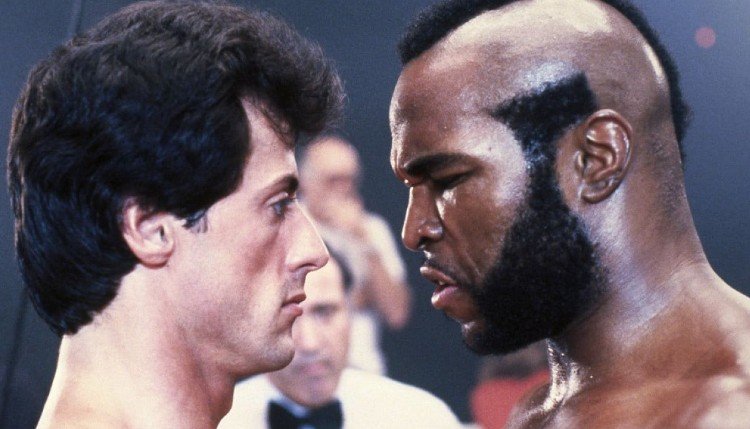
We do a little bit of time-shifting with Rocky III (the same as we did with Rocky II). If you’ll remember, though Rocky II was released in 1979, it actually takes place minutes after the first Rocky movie, which took place in 1976, so basically 1976 lasted for three years, after which we skipped over 1980 and now we’re safely ensconced within the realm of 1981 for Rocky III. Wibbly-wobbly, timey-wimey … It was a sudden shift that resulted in some changed hairstyles and clothing (noted for the full shunning of bell bottoms).
Rocky is a successful businessman, much in the same mold as Apollo Creed, who has retired and is now a commentator. Meanwhile, there’s a monster on the loose in the form of Mr.T’s Clubber Lang, a young, angry, hungry boxer who wants to take on the champ. Lang’s a braggart who does rounds with the slow-witted Rock, and claims Balboa can’t handle a real match anymore because he’s “civilized.” Rocky accepts Lang’s challenge, and they duke it out at the Spectrum, but because his trainer, Mickey, has just collapsed (and will eventually die of a heart attack), Rocky can’t keep his mind on the fight and Lang knocks him out.
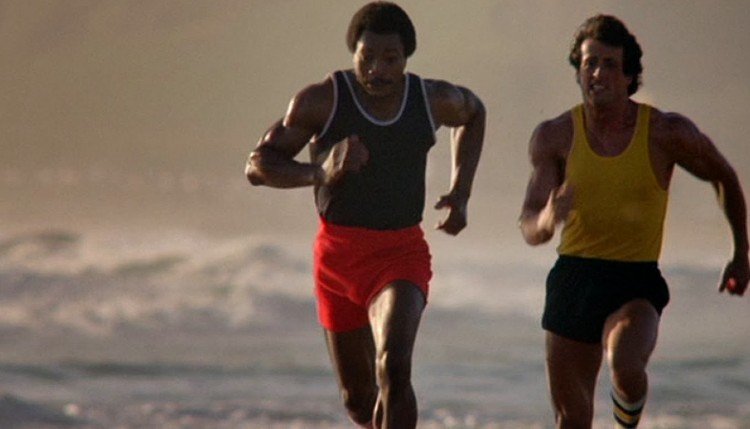
After a period of mourning, Balboa wants a rematch and he goes to Apollo Creed to train him. Creed takes him to Los Angeles, and it just doesn’t feel right Rocky not running down Philadelphia streets, Broad Street, Ninth Street, straight to the Art Museum (where a statue of Balboa was unveiled at the start of the movie). Instead, we have lush beaches and magic-hour sunsets. Creed trains him in the proper sense; as an athlete, where Balboa was a hulking freight train with power in his punches and the ability to take the abuse, Creed teaches him footwork and dancing. The movie is replete with montages and my favorite shows Creed and Balboa running along the beach.
Again, we get diminishing returns as far as story and characterization goes. Clubber Lang is a fierce creation, but he’s one-note. Talia Shire’s Adrian does practically nothing but complain and worry for her husband. I keep forgetting to mention Burt Young as Pauly, Adrian’s brother. I wonder why. The sequels seem to exist only for Balboa to get in the ring with yet another palooka after receiving a comeuppance of some sort, and then ultimately triumphing in the end, yet Rocky was an enormously successful franchise and Balboa became a film icon.

